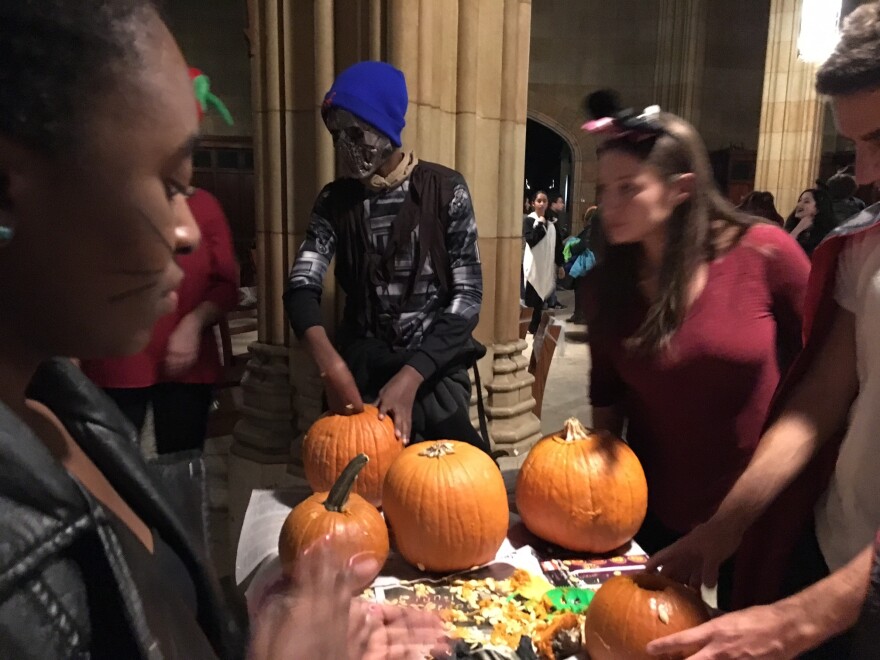A lot of refugees have no experience with Halloween. So a group of Yale students threw a Halloween party over the weekend to introduce teens in New Haven to the holiday.
Refugees settling in the United States have a lot to juggle - learning English, finding a job, starting school. All that can make it hard to have a social life. That's why a group of teen refugees in New Haven got together with Yale students this weekend for a very American tradition - a Halloween party. WSHU's Cassandra Basler was at the chapel on Yale's campus for the candy, costumes, dancing and pumpkin carving.
BASLER: A 16-year-old is up to his elbows in pumpkin guts, hollowing out his first jack-o'-lantern. His name is Innocent Nsengiyera. I asked him if he thinks pumpkin carving is kind of gross.
INNOCENT NSENGIYERA: Yeah, really gross.
BASLER: Nsengiyera's friend Alexandra Leone offers him a spoon. Leone met him through the Yale Refugee Project, a volunteer group that pairs students with resettled families.
ALEXANDRA LEONE: Will that help to get the insides a little looser?
NSENGIYERA: No.
LEONE: No? (Laughter).
BASLER: This is Nsingiyera's first Halloween party since he settled in New Haven from Rwanda two years ago. He's excited to wear his costume - a metallic skeleton mask from the Terminator movies. He says his English has improved a lot since he joined the youth group and started high school.
Harper Rose Loonsk is with the Yale group. She plans family-friendly events where young people can hang out after school with their parent's permission.
HARPER ROSE LOONSK: One thing that we deal with is that families won't want their young adult, like, their young kids or their teenagers to go out. So it's not like we're going out and doing crazy teenager things. We're doing fun events that are safe and anyone could actually go to.
BASLER: The idea is to help refugees feel less isolated. That's something 17-year-old Mahmood Shakir Mahmood says he felt when he arrived here three years ago.
MAHMOOD SHAKIR MAHMOOD: The first time when I see, like, a couple refugees when they came to United States, they just sit at the house and they do nothing, you know. And holidays or something after school, they don't do anything.
BASLER: Mahmood is a refugee from Baghdad. He says while he waited for two years in Jordan for permission to come to the United States, he saw pictures of Halloween online. It was one of the things that he looked forward to.
MAHMOOD: I wish I have, like, a Halloween in my country because it's like something really good. And I see, like, people became a new people, tried to copy other people...
BASLER: Like putting on costumes and stuff?
MAHMOOD: ...Yeah. I said when I'll be there, I'm going to celebrate that.
BASLER: Behind Mahmood, a group of Syrian teenagers who all arrived in New Haven this year add Arabic music to the party playlist. Mahmood explains how everyone is dancing together, stepping in and out of a circle.
MAHMOOD: It's called a dabke, a Syrian dabke. It's like a traditional dance for their country. And they try to teach the other people to, like, teach them how to dance.
BASLER: Some of the teens say they're too old for trick or treating, but everyone enjoys the dance party.

